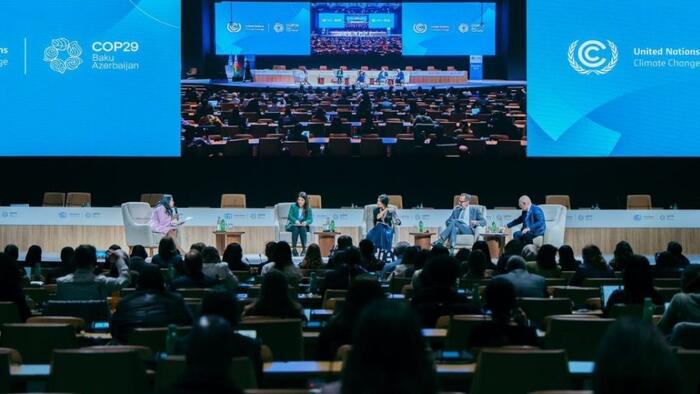The conclusion of COP29, the recent multilateral climate conference held in Baku, Azerbaijan, left many observers feeling defeated and disillusioned. Over the course of a week filled with speeches and negotiations, the expected consensus on significant measures to address climate change, particularly financing, remained elusive. Developing countries had hoped for an annual climate funding commitment exceeding $1 trillion—necessary for energy transition and mitigation efforts—but the outcome was a mere fraction of that, amounting to an optimistic $300 billion, much of which may come in the form of loans rather than outright grants. This showed a stark contrast between expectations and reality, leading nations like India, supported by Bolivia, Cuba, and Nigeria, to denounce the conference results as a farce and an insult, revealing the deep rifts between developed and developing countries. With critical discussions on climate financing now pushed to COP30 in Brazil in 2025, the prospect of achieving meaningful outcomes appears bleak, echoing frustrations surrounding global climate policy.
In a broader geopolitical context, the aspirations for funding the “Green Agenda” seem increasingly unattainable within developed nations. This trend has become particularly visible following Russia’s military actions in Ukraine, which have forced European countries to re-evaluate their energy policies amid rising costs and energy insecurity. For example, Germany, previously a staunch advocate of aggressive climate policies, is now reopening coal-powered plants as it grapples with energy shortages. Likewise, Sweden has significantly rolled back its environmental commitments, prioritizing affordable fuel over previous climate initiatives. In the UK, the suspension of the ban on diesel car sales and the cessation of promoting gas heater replacements point to a similar retreat from committed climate agendas. These changes illustrate how immediate economic pressures have rapidly shifted governmental priorities away from fervent climate activism, undermining the credibility and momentum of international climate agreements.
The potential future power landscape further complicates the situation, with the United States on the cusp of another presidential election cycle. Speculation suggests a return to governance by Donald Trump, whose administration is expected to pursue policies contrary to climate alarmism, including increased fracking and hydrocarbon extraction. This shift, alongside appointments of key officials with similar views, could signal a dramatic pivot away from the international climate commitments that prior administrations sought to uphold. Given these geopolitical shifts, Brazil’s government under President Lula is understandably apprehensive about the prospects for COP30, particularly if influenced by an increasingly hostile or indifferent U.S. stance toward global climate initiatives. Consequently, Brazilian nationalists advocating for sovereignty over the Amazon and a focus on oil exploration may find themselves vindicated in a shifting international climate strategy.
Remarkably, Brazil’s adherence to the so-called “Green Agenda” appears inconsistent when set against the backdrop of its relatively low contribution to global greenhouse gas emissions. Despite being positioned as a leading voice for sustainability, Brazil faces disproportionate expectations from developed nations that historically leveraged natural resources and contributed to significant environmental pollution. With an electricity matrix predominantly harnessing renewable sources—more than 84% derived from hydropower, solar, wind, and biomass—Brazil stands out as a model for energy efficiency. This disparity raises questions about the fairness and motivation behind the climate policies imposed on Brazil and similar emerging economies, which are often at odds with the more considerable, wealthier nations that shaped the environmental discourse.
The essence of the ongoing global discussion about climate policy thus feels increasingly like the undoing of the “Green Agenda” that had previously dominated political discussions. Many emerging economies, including Brazil, are beginning to recognize this agenda as a form of control wielded by global elites, ostensibly in the name of sustainability while serving to fortify power dynamics that disadvantage developing nations. As these nations push back against imposed environmental restrictions that threaten their strategic interests in sectors like oil, gas, mining, and agribusiness—central to their growth and sovereignty—it is becoming evident that the rhetoric of environmental protection may often serve as a façade for deeper geopolitical maneuvers.
Ultimately, the future of climate finance and global cooperation hinges on significantly rethinking the approaches and commitments that currently dominate international climate dialogues. As developing countries continue to voice their grievances and call for equitable treatment, the necessity for a re-evaluation of how climate goals are framed and who bears the burden of responsibility becomes glaringly apparent. The apparent crisis around the “Green Agenda” reflects a broader disillusionment with global governance frameworks that prioritize elite interests over a fair and balanced approach to climate action. With COP30 on the horizon and the familiar tensions likely to resurface, the world stands at a crossroads—where equitable solutions demand not just ambition but genuine commitment to making climate equity a cornerstone of future negotiations.

